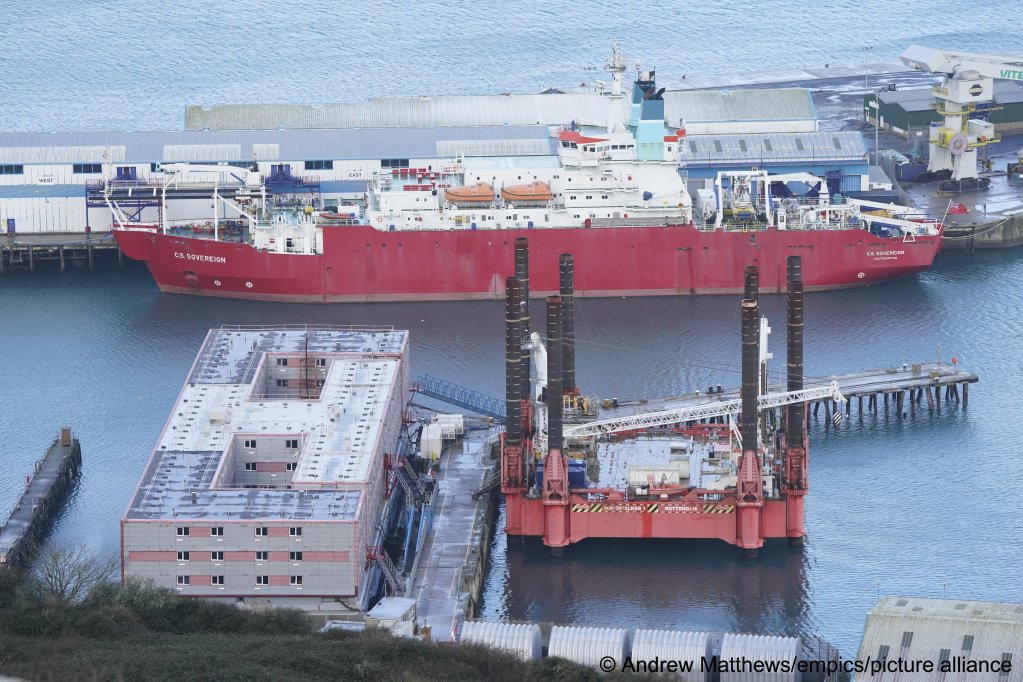The UK government is relocating hundreds of asylum seekers from the Bibby Stockholm barge, with around 300 of 400 men already moved to locations across the country.
The UK government has begun relocating hundreds of asylum seekers off the Bibby Stockholm barge, where they have been housed temporarily while awaiting their asylum decisions. Around 300 of the 400 men have already been moved, dispersed across various UK locations, including Cardiff, Wolverhampton, Bristol, and Worksop, the BBC reported.
The Home Office has confirmed that the remaining asylum seekers, will not be relocated to Portland or other Dorset areas. They will be sent to various sites across the country, where they will await the outcomes of their asylum claims.
Once in temporary accommodation, they will be told if they have been granted leave to remain in the UK. Those granted leave to remain will have 30 days to secure alternative accommodation, while those denied can appeal and will receive continued support during that process.
It was previously announced that the contract for the Bibby Stockholm, which has been moored off Portland in the southeast of England since 2023, would expire in January 2025.
The early closure of the Bibby Stockholm was officially announced in July as part of the new Labour government’s commitment to streamline the asylum process, address system backlogs, and reduce reliance on high-cost temporary housing. Shutting down the barge is part of this initiative to fix and reform the asylum system, and is expected to take several weeks.
Read AlsoUK:The end of the Rwanda plan

New 'fix' for asylum system
The move is part of a broader plan by the government to reduce costs and ease strain on the asylum system, with an estimated savings of 7.7 billion pounds over the next decade.
The Bibby Stockholm was intended to lower the daily expense of accommodating asylum seekers, which stood at 8 million pounds a day in March this year by housing them in hotels.
However, the barge scheme itself also proved to be very costly. In March 2024, the UK’s National Audit Office reported that the initiative was expected to cost taxpayers an estimated 46 million pounds more than housing asylum seekers in hotels. The overall expenditure, which was meant to cover repurposing the Bibby Stockholm barge and former military bases, was projected to reach 1.2 billion pounds.
Following the UK general election in July, the new finance minister Rachel Reeves accused her predecessors of extreme fiscal mismanagement in relation to asylum policy, including claims that the former government concealed a 22 billion pound "black hole" in the public finances.
A Home Office spokesperson said in a statement that the current government “inherited an asylum system under unprecedented strain, with thousands stuck in a backlog without their claims processed."
He claimed that "immediate action" is being taken to restart asylum processing which will save an estimated 7 billion pounds for the tax payer over the next ten years, as well as a "a major uplift" in returns to remove people with no right to be in the UK.
“We remain absolutely committed to ending the use of hotels for asylum seekers,” he added.
Read AlsoUK: Hotels may continue to house asylum seekers due to backlog

Concerns about conditions onboard
Beyond financial concerns, the barge faced widespread criticism for safety and welfare issues. A Legionella outbreak was detected shortly after the first residents boarded, sparking immediate concerns over the water quality and sanitary conditions.
The vessel became even more controversial following the death of an Albanian resident, 27-year-old Leonard Farruku, who was found dead in a shower room on the barge. It is believed Farruku took his own life, raising serious questions about the mental health support and conditions on board.
This incident, combined with reports of inadequate living conditions -- such as infestations, bedbugs, and limited personal space -- drew significant backlash from local campaigners and national organizations. Over 50 organizations, including the Refugee Council, Asylum Matters and Refugee Action, described the barge as "entirely inappropriate" to house migrants.
Giovanna Lewis from the Portland Global Friendship Group, which has been supporting the residents of the barge, told the BBC that the men are being taken individually by taxi to their new accommodation around the country. They will stay there for three or four weeks supported by the Home Office until the decision on their status is made.
"If they are given the right to remain they have 30 days to find alternative accommodation. If they are refused they have the right to appeal and are supported while that appeal takes place."
